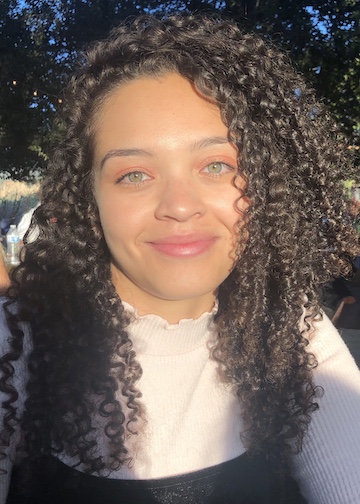Alumni Spotlight: Caitlin Harris
Works in the Department of Microbiology, Immunology, and Molecular Genetics at UCLA in Dr. Yvonne Chen’s lab.

Major & Concentration:
B.S. in Biological Sciences: Cell and Developmental Biology, 2016
B.A. in Psychology, 2016
Masters degree, 2020:
Project title: Characterizing the reactive oxygen species response to infection in
Drosophila
plasmatocytes.
Advisor: Catherine Brennan
What are you doing now?
I am working at UCLA in the Department of Microbiology, Immunology, and Molecular Genetics in Dr. Yvonne Chen’s lab, which works on engineering CAR-T cells. We are currently working on a clinical trial to treat B cell malignancies (lymphomas and leukemias). My responsibilities include manufacturing patient products (CAR-T cell treatments), designing and executing experiments to help optimize our procedures for clinical trials, and working on preclinical experiments for future trials.
What were you involved with at Cal State Fullerton?
I was a TA during my graduate program in microbiology with Dr. Esther Chen and immunology with Dr. Catherine Brennan. I learned how to effectively communicate information to students in a way that was easy to understand, which has helped me in my current position. I frequently teach and explain techniques to other people on our team, just like I did as a TA.
How did you choose your career and what role did CSU Fullerton play in finding your career?
I knew that I wanted to work in a field that had a direct impact on patient health while also being able to continue researching. Dr. Yvonne Chen spoke at a CSUF seminar that I attended and I found her lab research fascinating. When I got the opportunity to work in her lab, I knew right away that was where I saw myself. The biology courses I took as an undergrad included a lot of hands-on experience in lab that became very helpful when looking for a job in my field. Skills such as cell culture technique and working in a sterile environment are very important. Many of the applicants we see lack basic lab skills and cell culture experience and those that have that experience really stand out to our team. The professors at CSUF do a great job in designing lab courses where students learn the techniques that are applicable to the real world and develop critical thinking skills. When I started the graduate program in Dr. Catherine Brennan’s lab, I was able to take the skills I learned as an undergrad and use them on a daily basis. I got significantly more practice with these skills and my experience level went from novice to advanced. The small cohort size in the CSUF biology graduate program allows for more one-on-one time with your Principal Investigator (PI) that is not common in larger lab settings. This helped me learn new skills and improve my ability to think critically and develop my own experiments. The support from Dr. Brennan during my graduate program helped me become a successful scientist.
What are the pros and cons of your career?
Pros:
It is very rewarding because I get to see the direct benefits of my work when a patient responds to treatment and goes into complete remission.
I am constantly learning new things and am able to take the lead on designing experiments and have independence in my daily work life.
It is very fast-paced.
Cons:
It is a high stress job because the products that we make directly go into patients, which could potentially be harmful.
What was your work/life balance like at Cal State Fullerton and what is it like now?
I would say a lot of my free time went to studying and attending classes as an undergrad. In the CSUF graduate program, I spent quite a bit of time in the lab but was still able to enjoy free time with friends and family and take time off during the holidays. My current work/life balance is a bit better than when I was a student, but there are often times where I need to work more hours than a standard 40-hour work week.
What advice would you give current CSUF Biology students?
I would suggest paying close attention when learning new techniques during lab classes. Learning basic lab skills and cell culture techniques can really help when you start your career. I would also recommend joining a lab on campus so you can design your own experiments. Having undergrad lab experience is very helpful whether you go into industry or into a graduate program.
